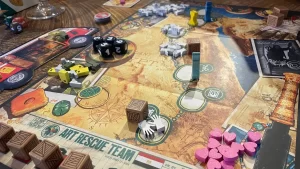Tabletop games have long been celebrated as a vibrant and imaginative escape from the mundane routines of everyday life, providing players with an opportunity to step into worlds filled with magic, adventure, and camaraderie. At their core, tabletop games are not just about rolling dice and moving pieces across a board; they offer a unique social experience that encourages creativity, collaboration, and strategic thinking. One of the most compelling aspects of tabletop gaming is its ability to transport players into alternate realities where they can embody characters far removed from their own lives. Whether battling dragons in a fantasy realm or navigating the intricacies of a historical scenario, players engage in narratives that stimulate their imaginations and allow them to explore aspects of themselves they may not ordinarily express. This act of immersion is especially appealing in today’s fast-paced world, where people often feel overwhelmed by responsibilities and the pressures of daily life. The communal aspect of tabletop gaming further enhances its appeal as an escape.

Gathered around a table with friends or family, players share laughter, strategic discussions, and unexpected twists that arise during gameplay. This shared experience fosters connections and strengthens relationships, creating a sense of belonging that is often lacking in contemporary society. In an age dominated by digital interactions, the tactile nature of tabletop games—holding cards, rolling dice, and moving physical pieces—adds a layer of engagement that enhances the overall experience. It encourages face-to-face interaction and nurtures bonds that can be difficult to form through screens. Moreover, tabletop games often involve cooperative elements, where players must work together to achieve a common goal, reinforcing teamwork and communication skills. This collaborative spirit creates an environment where everyone’s contributions are valued, making players feel invested in both the game and their fellow players. In addition to fostering social connections, tabletop games also provide a platform for personal growth and self-discovery.
Players can experiment with different roles and personas, warhammer store san antonio have exploring traits and behaviors that they might not typically express in their daily lives. This exploration can lead to increased empathy and understanding as players learn to navigate the motivations and challenges of their characters. Furthermore, many tabletop games require critical thinking and problem-solving skills, as players must devise strategies to overcome obstacles and defeat adversaries. This mental engagement not only provides an intellectual challenge but also serves as a healthy outlet for stress and anxiety. By immersing themselves in complex scenarios, players can momentarily set aside their worries and immerse themselves in problem-solving within a fantastical context. Ultimately, the allure of tabletop games lies in their ability to blend escapism, social interaction, and personal growth into a single, enriching experience. They offer an opportunity to break free from the constraints of reality, providing a canvas for creativity and collaboration. As players navigate diverse worlds, tackle challenges, and forge meaningful connections, they discover not only the joy of play but also the profound impact that these experiences can have on their lives.


